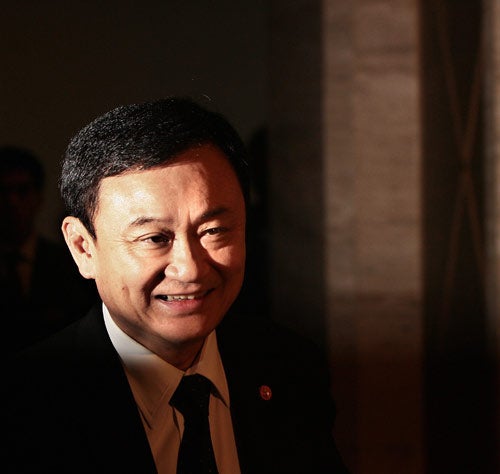New blow in Thaksin's bid to recover his frozen assets

Your support helps us to tell the story
From reproductive rights to climate change to Big Tech, The Independent is on the ground when the story is developing. Whether it's investigating the financials of Elon Musk's pro-Trump PAC or producing our latest documentary, 'The A Word', which shines a light on the American women fighting for reproductive rights, we know how important it is to parse out the facts from the messaging.
At such a critical moment in US history, we need reporters on the ground. Your donation allows us to keep sending journalists to speak to both sides of the story.
The Independent is trusted by Americans across the entire political spectrum. And unlike many other quality news outlets, we choose not to lock Americans out of our reporting and analysis with paywalls. We believe quality journalism should be available to everyone, paid for by those who can afford it.
Your support makes all the difference.His aspirations for Manchester City are as grandiose as ever but Thaksin Shinawatra's hopes of getting his hands on £800m of frozen assets in Thailand were dealt a significant blow yesterday when, just as the former Prime Minister went on trial on fraud charges in Bangkok, a leading member of the party loyal to him was found guilty of electoral fraud.
Thaksin's trial could result in him and his wife, Pojaman, being jailed for up to 13 years. The build-up has been less than encouraging. Three of his lawyers were jailed last month over claims that they tried to bribe the judge by handing him cash in a cake box.
But the opening of the case, which the Thaksins were not in court to hear, was overshadowed by the decision of the Supreme Court that former House Speaker Yongyuth Tiyapairat, of the People Power Party (PPP) loyal to Thaksin, was guilty of vote-buying in the northern province of Chiang Rai before last December's election. The PPP's success in that ballot saw a number of military and legal personnel who had supported the coup which removed Thaksin sidelined. Thaksin then returned from exile – bringing City players Kaspar Schmeichel and Kelvin Etuhu with him on his private jet – to win back his money and face charges. City have made no secret of the importance of him securing the assets.
Yesterday's ruling places more pressure on the PPP-led six-party governing coalition currently facing street protests over accusations that it is too close to Thaksin and it may persuade the country's Election Commission that the entire PPP should be disbanded and new elections held. That would appear to leave Thaksin's struggle for his cash as far away from resolution as ever.
The Supreme Court ruled that Yongyuth – a former adviser to Thaksin – should be banned from politics for five years. The legal process that leads to party dissolution can take months so it will be another anxious wait for Thaksin.
Meanwhile, the ex-PM's own future liberty is by no means guaranteed as the two-month trial begins which will examine whether the telecoms tycoon illegally arranged for his wife to buy a prime chunk of Bangkok land for just one third of its value. The corruption case is one of many being brought against Thaksin and his allies, and it threatens to bog down a new Government – led by Thaksin loyalists – already facing mass protests in the streets.
Thaksin's lawyer Anek Khamchum voiced confidence that the evidence would be "enough to prove in the court that Thaksin and his wife are not guilty". Thaksin and his wife insist that the charges against them are politically motivated. But the courts have already been unexpectedly resilient in bringing the case. The government has tried to weaken it by arguing that the military-backed bodies which investigated Thaksin had no legitimacy. The courts have ignored that, and have even intervened to reverse other government decisions. Some observers in Thailand perceive this as a judicial revolution – in which the courts are quietly being asked by the traditional elite to act as checks on the power of elected governments.
The court heard yesterday that the 772m baht (£11.6m) Pojaman Thaksin paid the Financial Institutions Development Fund for 5.5 hectares of prime land in central Bangkok represented only a third of the land's true market value. Banharn Silapa-archa, a political ally of Thaksin, told the court the former Prime Minister could have had little influence on the process of buying land. But Chuan Leekpai of the opposition Democrat party said Thaksin had been able to exert influence.
Join our commenting forum
Join thought-provoking conversations, follow other Independent readers and see their replies
0Comments